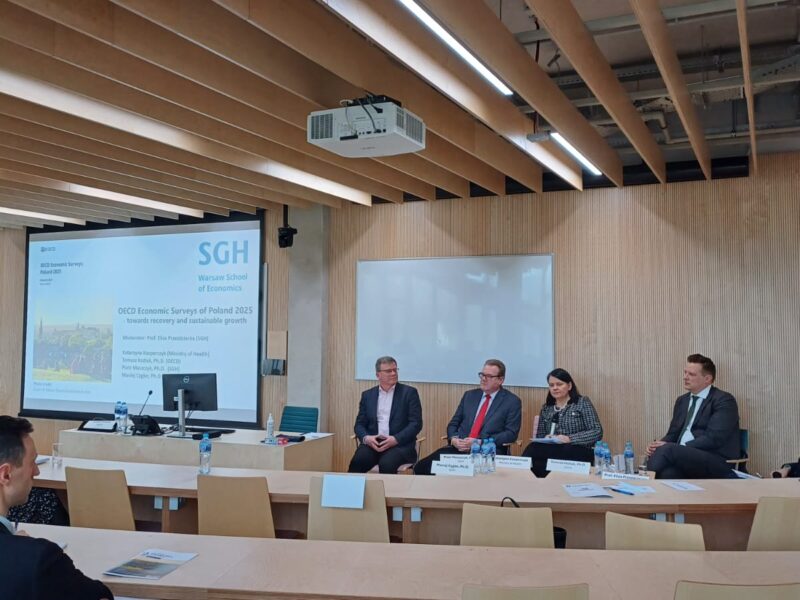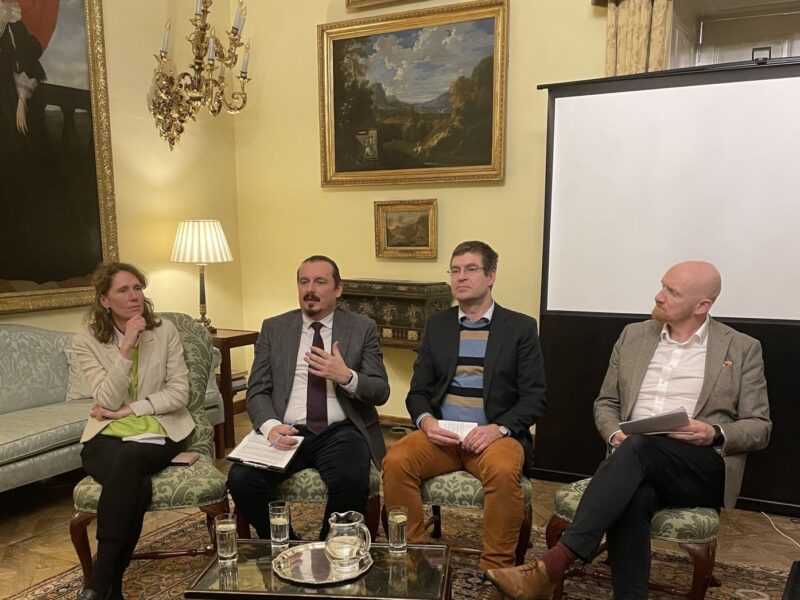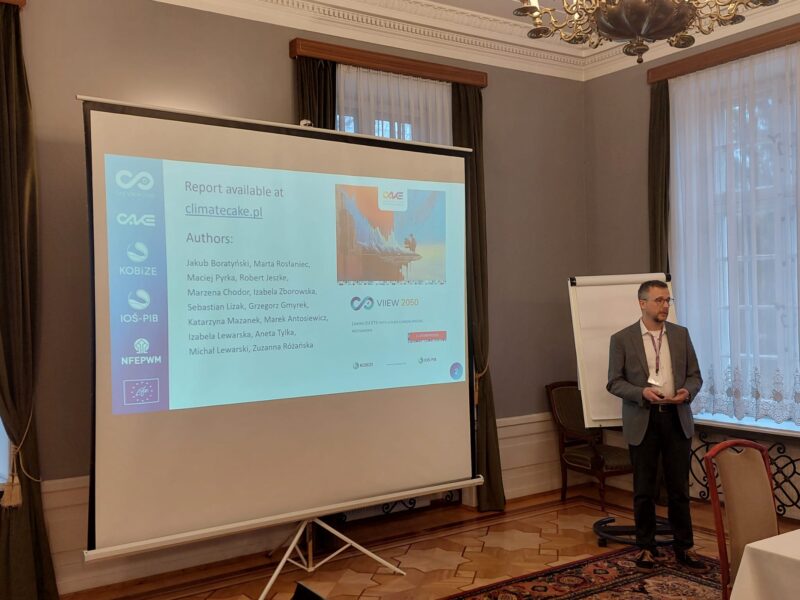We bring you the fifth issue of our publication “GO2’50. Climate. Society. Economy” prepared by The National Centre for Emissions Management (KOBiZE) and the Centre for Climate and Energy Analysis.
 GO2’50. Climate. Society. Economy vol. 5 (11.3 MiB, 42 hits)
GO2’50. Climate. Society. Economy vol. 5 (11.3 MiB, 42 hits)
Articles:
Each successive edition confirms how broad and multidimensional the impact of climate policy is on the economy, society and the day-to-day functioning of different sectors. Changing regulations, new mechanisms and tools to reduce greenhouse gas emissions pose numerous challenges to businesses and governments, but also open up space for analysis and the search for the best solutions.
In the latest issue, we look at the future of the EU ETS CO2 allowance market and assess the CO2 border price adjustment mechanism (CBAM), which, after one year of operation, is generating much debate. We also discuss extremely important issues related to the transformation of district heating, especially in countries such as Poland, where this process is proving to be extremely difficult and complex. In this context, we analyse the possible paths of change and their consequences for the market and society.
One of the key areas of this issue is the European Union’s climate and energy policy, which is constantly evolving and becoming increasingly complex. Both existing mechanisms and those yet to be implemented or planned are subject to change. We discuss in detail the new rules for the free allocation of EU ETS allowances and the new monitoring, reporting and verification obligations that will cover the shipping sector. We also bring you up to date on the new Emissions Trading Scheme for Buildings and Road Transport (ETS2), analysing its principles of operation and the potential opportunities and threats it brings for Poland in the context of the energy transition.
We also do not forget about agriculture – a sector that is at the intersection of two challenges: the growing demand for food and the need to reduce the negative impact on the climate and the environment. Is organic farming the right direction in this situation? This is the question the authors of one of the articles try to answer by looking at the real effects of the regulations being implemented and their consequences for producers and consumers.
The development of EU climate policy entails not only regulatory changes, but also concrete economic impacts. In this issue, we address the impact of the European Commission’s proposed 2040 GHG emissions reduction target, analysing its implications for the competitiveness of European markets and the potential costs for consumers. Given Poland’s upcoming presidency of the EU Council in the first half of 2025, the discussion around these issues takes on particular importance.
In the context of global climate negotiations, we cannot overlook the role of transparency in the implementation of the Paris Agreement, which is crucial for the effectiveness of international action. We also look at the process of integrating Ukraine’s climate policy into the EU ETS, analysing what challenges and opportunities this brings for both sides.
Each new year brings new climate, energy and economic challenges. In this latest issue, we try to capture the most relevant ones, providing solid analysis and expert commentary.
We invite you to read on!

On the 4th February 2025 Maciej Cygler, our CAKE/KOBIZEexpert participated in the presentation of the OECD report: Economic Survey for Poland 2025.
The OECD has published its Economic Survey for Poland 2025. The report was presented at the SGH Warsaw School of Economics on 4 February 2025. While it focuses mainly on macroeconomic policies, health care and the green transition were also recognised as important issues and were addressed in individual chapters.
The presentation of the study by Zuzana Smidova, one of its co-authors, was followed by a panel discussion, perfectly moderated by Eliza Przeździecka, Director of the Institute of International Economics at SGH, who invited Katarzyna Kacperczyk, Deputy Minister of Health, Maciej Cygler, expert from the Centrum Analiz Klimatyczno-Energetycznych (CAKE) / Centre for Climate and Energy Analysis and SGH Faculty, Piotr Maszczyk, SGH Faculty, and Tomasz Kozluk, OECD Advisor.
Our CAKE/KOBIZE colleague Maciej Cygler appreciated the OECD’s findings, which underline the importance of the green transition and acknowledge the scale of the challenges. He also agreed with the main recommendations of the review and the opinion of OECD Chief Economist Alvaro Santos Pereira, who said that more efforts are needed to address long-term challenges, including the green transition. He also noted that the evaluation of Poland’s achievements in the field of climate policy and energy transition must consider the fact that Poland is a member of the EU, which affects both the setting of these policies’ targets and their implementation. He mentioned that this good report would be even better in terms of green transition if more use were made of CAKE’s analytical reports, which show both the impacts of climate policies and effective ways of implementation.
Thank you for valuable discussion.

On 22-23 January 2025. Robert Jeszke, Deputy Director of IOŚ-PIB for Emissions Management, Head of KOBIZE and CAKE, participated in a meeting on climate communication and disinformation, organised and hosted by the British Embassy in Prague. This important event brought together experts and practitioners from academia, think tanks, NGOs and British Embassies from nine Central European countries (Austria, Bulgaria, Croatia, Czech Republic, Hungary, Poland, Romania, Slovakia and Slovenia).
The first day included a panel discussion entitled ‘Climate Ambition in Central Europe and Cost of Non-action’, chaired by Ambassador Matt Field OBE hosting – alongside Robert Jeszke – Anna Walters from the Foreign, Commonwealth and Development Office and Petr Holub from the Ministry of the Environment of the Czech Republic, while the next day included a workshop on climate communication and disinformation – as it turns out, a very important, yet still underestimated sphere of climate policy.
Disinformation is a significant and growing threat in the climate debate. Moreover, this does not only apply to climate policy itself, but also to the use of this area for actions – very often hostile – taken to achieve goals in other fields, both nationally and internationally. The challenges of effectively communicating climate knowledge at a time when changing. The first day featured a panel discussion entitled ‘Climate Ambition in Central Europe and Cost of Non-action’, chaired by Ambassador Matt Field OBE hosting – alongside Robert Jeszke – Anna Walters from the Foreign, Commonwealth and Development Office and Petr Holub from the Ministry of the Environment of the Czech Republic, while the next day featured a workshop on climate communication and disinformation – as it turns out, a very important and still underestimated area of climate policy.
Disinformation is a significant and growing threat in the climate debate. Moreover, this does not only apply to climate policy itself, but also to the use of this area for activities – very often hostile – undertaken to achieve goals in other fields, both nationally and internationally. The challenges of communicating climate knowledge effectively at a time when climate change is not necessarily the most important issue in the region at any given moment are proving demanding. Of note is the recent Poland Disinformation Team Report (January 2025), which highlights tactics used to undermine climate science, including discrediting scientists, manipulating data, shifting blame and spreading conspiracy theories. It highlights how disinformation uses public fears, economic concerns and geopolitical tensions to undermine confidence in climate action. Combating this phenomenon requires a multifaceted approach: transparent communication, high quality data and resistance to information manipulation.
At the Centre for Climate and Energy Analysis (CAKE), where we create knowledge to support decision-making, we are particularly aware of this and agree that it is our duty to counter such narratives with reliable, accessible and understandable information. Robert Jeszke also highlighted the importance of linking ETS systems in different regions of the world can increase market liquidity, leading to more competitive CO2 prices, technology transfer and lower abatement costs. He encouraged the public to read the CAKE analyses and reports available on our website: CAKE reports.
Expressions of gratitude are extended to Ambassador Matt Field OBE, the organisers, notably Blanca Danišová from the British Embassy in Prague and Angelika Gronowska-Starzenska from the British Embassy in Warsaw, and all the participants for establishing such an inspiring environment for the exchange of ideas.Special acknowledgement is reserved for the panellists Anna Walters from the Foreign, Commonwealth and Development Office and Petr Holub from the Ministry of the Environment of the Czech Republic.

 The end of 2024 also marks the end of the LIFE VIIEW 2050 project implemented by the Centre for Climate and Energy Analysis (CAKE/KOBiZE). The LIFE VIIEW 2050 project – The impact assessment of the EU Emission Trading System with the long-term vision for a climate neutral economy by 2050 – ran from 2020 to 2024, when the climate and energy policy impact analyses foreseen by the project were developed and their results have been shared in our main reports published on http://climatecake.pl/, but also in other publications and events where we have presented the outcomes of our work. We are pleased to have had the opportunity to work with many of you contributing to improvements in the quality of our work and make it as responsive as possible to the expectations of our stakeholders. Sincere thanks for that.
The end of 2024 also marks the end of the LIFE VIIEW 2050 project implemented by the Centre for Climate and Energy Analysis (CAKE/KOBiZE). The LIFE VIIEW 2050 project – The impact assessment of the EU Emission Trading System with the long-term vision for a climate neutral economy by 2050 – ran from 2020 to 2024, when the climate and energy policy impact analyses foreseen by the project were developed and their results have been shared in our main reports published on http://climatecake.pl/, but also in other publications and events where we have presented the outcomes of our work. We are pleased to have had the opportunity to work with many of you contributing to improvements in the quality of our work and make it as responsive as possible to the expectations of our stakeholders. Sincere thanks for that.
Of course, we are not stopping and there are more challenges ahead, including the new LIFE ENSPIRE project, and we will continue to count on your cooperation, comments, evaluations and advice in its implementation. Today, however, we would like to evaluate the activities already carried out, in particular those implemented under the LIFE VIIEW 2050 project, so please take a few minutes to complete the survey available at the following link:
Your evaluation will help us to continuously improve the quality and relevance of our work.
Thank you very much!

On 19-21 November 2024, Jakub Boratyński, an expert from CAKE, took part in the International Macromodels 2024 Conference held in Jablonna, which was devoted to economic modelling and policy, as well as advanced econometric methods.
A representative from the CAKE team presented an analysis of the effects of combining the EU ETS with other global carbon pricing mechanisms. Other topics covered included:
During the presentation, an expert from the CAKE team presented the detailed conclusions of the analysis of the linking EU ETS with other the global ETS’s.